 Ethiopians must be shocked and have a mixed feeling about the breaking news on EPRDF’s decision to accept the unconditional implementation of the April 13, 2002 ruling by the Eritrea-Ethiopia Boundary commission. The war costed about seventy to hundred thousand Ethiopian lives. It is expected that the causality on Eritrean side would be in the same range. We also know that the root cause of the war is deeply intertwined with the Tigrean Peoples Liberation Front’s (TPLF) strategy of forging unbalanced alliance with the Eritrean Peoples Liberation Front (EPLF) during their armed struggle with the then government of Ethiopia, the Derg.
Ethiopians must be shocked and have a mixed feeling about the breaking news on EPRDF’s decision to accept the unconditional implementation of the April 13, 2002 ruling by the Eritrea-Ethiopia Boundary commission. The war costed about seventy to hundred thousand Ethiopian lives. It is expected that the causality on Eritrean side would be in the same range. We also know that the root cause of the war is deeply intertwined with the Tigrean Peoples Liberation Front’s (TPLF) strategy of forging unbalanced alliance with the Eritrean Peoples Liberation Front (EPLF) during their armed struggle with the then government of Ethiopia, the Derg.
We reckon that Ethiopia and Eritrea are far more than just neighbors because the two people share long history, culture, language and identity. Eritrea is comprised of nine ethnic groups: Tigres (40%), Tigre (30%), Afar (10%), Beja (5%), Nara (5%), Saho (4%), Bilen (2%), Kunama (2%) and Rashaida (2% Arabic speakers). Leaving the debate about the percentages aside, the following ethnicities are also found in Ethiopia: Tigres, Afar, Saho, Kunama, Bilen/Agew and Tigre in Eritrea is a language derived from Geez. Afar in Eritrea are people that live over 1,100 kilo meters of the Red Sea coast. The same people live in Afar region of Ethiopia. Since the countries share a border of over 1,000 kilometers, the announcement of Dr Abiy, if succeeds, implies a reunion of thousands of families.
Ethiopians consider Eritreans as their brothers and sisters. The very premise of the civil war in the eighties, at least as far as Ethiopians is concerned was a sincere belief that Eritreans were Ethiopians, but their war for independence was instigated and fueled by those who consider Ethiopia as strategic enemy. No Ethiopian even to this date believes that an Afar in the then province of Eritrea is less Ethiopian than an Afar who lives across the present border line. This comparison holds true for all ethnicities in Eritrea be it a Hamasen, Kunama, Bilen, Saho, or Tigre etc. Despite all these, the breaking news on the move by government of Ethiopia ignites two significant concerns.
First, comes the degree of appeasement by the rulers in Ethiopia when dealing with aggression by neighbors. This weakness is manifested both by the Derg and TPLF. In the seventies Somalia invaded Ethiopia but at the end of the destruction, Ethiopia got total victory. The question is what did the Derg do so that its other neighbors learn a lesson that aggression on Ethiopia would have serious consequences? It is about war reparation and there was none. There must have been a punitive war compensation through either in the form of money or a claim on a certain territory of the aggressor. However, Derg should be commended for not going through arbitration and jeopardize the fruit of the victory through unwanted war.
In the Ethio-Eritrean war, again the aggressor was Eritrea! The panel at the Hague had also established this important fact, the Eritrean regime was the aggressor, but the panel awarded Badme to Eritrea. No matter what the reason was, aggression must have serious consequences, a negative incentive. That is what history teaches us! According to a report by BBC, Ethiopian army not only repelled the Eritrean aggression but, in its counter-offensive, ended up controlling over a quarter landmass of Eritrea. That being the ground for the decision of the Hague Panel, we are forced to raise the following important questions.
As a victor why did Meles chose not to dictate the OAU’s peace framework? Why did he surrender the issue for a judgement by arbitration? Why did he, allegedly, provide arbitrators with evidence that counted against Ethiopia’s claims, and why sign the Algiers Peace Agreement on December 12, 2000, handing out the fruits of the total victory to Eritrea? What about the hundred thousand lives lost not to mention the material resources the country has been forced to waste? Why didn’t he at least legally claim Assab, the natural and historical port of Ethiopia? And why is the peace process expedited at this moment through a pressure by TPLF when both Meles and Hailemariam sat on the issue for years?
Second, it is great that Dr. Abiy is extending his positive message of peace to Eritrea. However, Ethiopians cannot forget the negative impact of TPLF’s inappropriate relation with EPLF until the war broke in May 1998. Before the war, those who associate themselves with Eritrean People Liberation Front had a status of first class citizen in Ethiopia. They simply had more rights than others, even more rights than members of TPLF itself. Just go back and see the story behind the assassination of General Hayelom. That speaks volumes! Most Ethiopians were happy with the conflict not only because that gave them an opportunity to release the anger and frustration on EPLF, but the conflict voided the special privileges of some Eritreans that took advantage of the situation by teaming up with EPLF. It must be noted that the demand of Ethiopians was not deportation of Eritreans, but have Eritreans play by same rule of law as the rest of Ethiopians. The unpopular deportation was a political decision by TPLF.
The mixed feeling now is from a pessimism and suspicion as to what TPLF has in store for the rest of Ethiopians. This is what Americans would call, what is the catch here? No matter what the plans of TPLF are, we are about to see what Eritreans truly are? Are they going to reactivate the same old Coffee-Exporting drama or not? Is EPLF going to release all prisoners including Derg’s high ranking military officers it kept in its dungeons for the last 27 years? The current Badme situation is the outcome of a total blunder by Meles Zenawi, and Dr. Abiy has nothing to do with it. Not at all! However, I wish Dr. Abiy prioritizes the interest of Ethiopians at large in the new relationship with EPLF/Eritrea. It is no doubt the move directly benefits the millions of Ethiopians and Eritreans across the border. On a higher level, I hope Dr. Abiy and Ato Esaias come to their senses, stay away from mischiefs and instead genuinely cooperate to work in tandem towards a joint economic & democratic progress, and possibly a confederation that can ultimately lead the two people in the long run, to an acceptable Federation.
We are yet to see how Dr. Abiy’s message is received by Asmara!


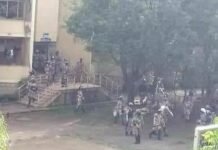

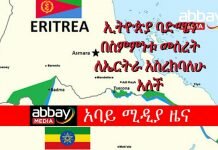












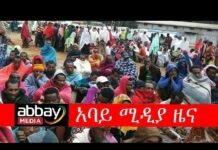




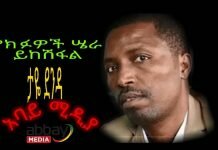
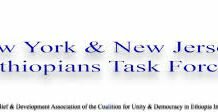
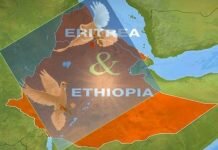

![Why the Rush to Privatize Ethiopia’s Strategic Assets Now [Aklog Birara (DR.)]](/wp-content/uploads/2018/04/DR-BIRARA-1-218x150.jpg.pagespeed.ce.rgO2K5Oq-h.jpg)









![አዲሱ የአማራ ብሄር ፓርቲ ስጋትና ተስፋዎች [ዋዜማ ራዲዮ] ee016d0038df4fdb2b6a2e596998817f](/wp-content/uploads/2018/06/xee016d0038df4fdb2b6a2e596998817f-100x70.jpg.pagespeed.ic.kmwjKJFL6_.jpg)







